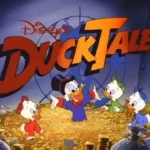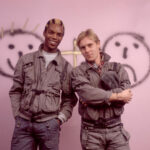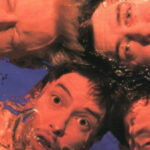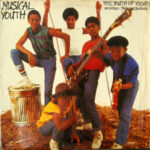In the annals of animated television, few shows hold the cultural weight and enduring legacy of DuckTales. Premiering in 1987, the series introduced audiences to the globetrotting adventures of Scrooge McDuck, his grandnephews Huey, Dewey, and Louie, and a colorful cast of friends and foes. The show became an instant hit, revolutionizing television animation and becoming a cornerstone of Disney’s burgeoning TV empire.
Over three decades later, DuckTales remains a beloved property, thanks to its unforgettable characters, gripping storytelling, and groundbreaking approach to animation. With a reboot in 2017 that reimagined the classic series for a new generation, DuckTales has proven that its appeal is as timeless as the treasures its characters seek.
This article will explore the origins, themes, and impact of DuckTales, diving deep into its creative genius, cultural influence, and the elements that made it a quacking good time for viewers of all ages.
The Origins of DuckTales
1. Carl Barks and the Comics Legacy
The roots of DuckTales can be traced back to the work of Carl Barks, a legendary Disney comic book artist and writer. Barks created the character of Scrooge McDuck in 1947, envisioning him as a miserly but adventurous billionaire. Scrooge’s escapades in Uncle Scrooge comics became wildly popular, blending humor, adventure, and treasure-hunting tales set in exotic locales.
Scrooge’s world was rich with memorable supporting characters, from his ever-loyal pilot Launchpad McQuack to his arch-nemesis, the Beagle Boys. Barks’ comics served as the foundation for DuckTales, with the show adapting several storylines and maintaining the adventurous spirit of the original material.
2. Disney’s Foray into Television Animation
In the 1980s, Disney sought to expand its reach into television, a medium it had previously avoided for fear of diluting its brand. The success of syndicated cartoons like He-Man and the Masters of the Universe convinced Disney that high-quality animated shows could thrive on TV.
With DuckTales, Disney aimed to set a new standard for television animation. The show was the first in a line of Disney Afternoon programs, a block of animated series that would dominate children’s programming throughout the late 1980s and 1990s.
3. The Production Team
The creative team behind DuckTales included Jymn Magon, a veteran of Disney’s music division, and Alan Zaslove, an experienced animation director. Together, they assembled a team of talented animators and writers who worked to translate the spirit of Carl Barks’ comics into a dynamic television format.
The Characters of DuckTales
1. Scrooge McDuck
At the heart of DuckTales is Scrooge McDuck, voiced by the legendary Alan Young. Scrooge is a complex character, balancing his love for wealth with a deep sense of adventure and family loyalty. His larger-than-life persona and penchant for treasure hunting drive the show’s narrative, making him one of Disney’s most iconic characters.
2. Huey, Dewey, and Louie
Scrooge’s grandnephews, Huey, Dewey, and Louie, provide a youthful counterbalance to their curmudgeonly uncle. In DuckTales, the triplets were given distinct personalities for the first time, with Huey often portrayed as the leader, Dewey as the adventurous one, and Louie as the laid-back schemer.
3. Supporting Cast
The show’s supporting characters are just as memorable:
- Launchpad McQuack: Scrooge’s loyal but accident-prone pilot. Launchpad’s comedic mishaps and boundless enthusiasm made him a fan favorite.
- Mrs. Beakley and Webby Vanderquack: Mrs. Beakley serves as Scrooge’s housekeeper, while her granddaughter Webby provides a touch of sweetness and spunk to the cast.
- Gyro Gearloose: The eccentric inventor whose gadgets often aid (or complicate) Scrooge’s adventures.
- The Villains: From the bumbling Beagle Boys to the conniving magician Magica De Spell, DuckTales boasted a rogues’ gallery of villains who added excitement and humor to the show.
The Episodes and Storytelling
1. Episodic Adventures
DuckTales followed an episodic format, with each episode presenting a self-contained story. The adventures often took the characters to far-flung locales, from ancient temples to outer space, as they searched for treasure or thwarted villainous schemes.
Episodes like “Treasure of the Golden Suns” and “The Curse of Castle McDuck” showcased the show’s ability to blend humor, action, and heart, creating stories that appealed to both children and adults.
2. Serialized Story Arcs
While most episodes were standalone, DuckTales also featured multi-episode arcs, a rarity in children’s programming at the time. The five-part pilot, “Treasure of the Golden Suns,” introduced viewers to Scrooge’s world and set the stage for the series’ adventurous tone.
3. Themes of Family and Morality
Beneath the treasure-hunting escapades, DuckTales explored themes of family, loyalty, and morality. Scrooge’s relationship with his nephews and his gradual softening over the series highlighted the importance of love and connection over material wealth.
The Animation and Music
1. High-Quality Animation
Disney spared no expense in making DuckTales a visual treat. The show’s animation quality was far superior to most television cartoons of the time, with richly detailed backgrounds and fluid character movements.
2. The Theme Song
No discussion of DuckTales would be complete without mentioning its iconic theme song, composed by Mark Mueller. With its infectious melody and unforgettable chorus (“DuckTales! Woo-oo!”), the song became a cultural phenomenon in its own right, instantly recognizable even decades later.
Cultural Impact
1. A New Era for Disney
DuckTales marked the beginning of a golden age for Disney television animation. Its success paved the way for other beloved series like Chip ‘n Dale: Rescue Rangers, Darkwing Duck, and TaleSpin.
2. Merchandising and Spin-Offs
The popularity of DuckTales spawned a wave of merchandise, from toys to video games. The 1989 NES game DuckTales became a classic in its own right, praised for its challenging gameplay and memorable soundtrack.
3. Global Reach
DuckTales was a worldwide phenomenon, translated into multiple languages and beloved by audiences across the globe. Its universal themes and timeless humor ensured its appeal transcended cultural boundaries.
The 2017 Reboot
1. A Modern Update
In 2017, Disney rebooted DuckTales with a new cast, updated animation style, and a fresh approach to storytelling. The reboot retained the spirit of the original while deepening character development and expanding the lore of Scrooge’s world.
2. New Voices, Familiar Faces
David Tennant took on the role of Scrooge McDuck, bringing a new energy to the character while honoring Alan Young’s iconic performance. The triplets, now voiced by distinct actors, were given even more defined personalities.
3. Expanded Lore
The reboot delved into the backstories of beloved characters, introducing new elements like Della Duck, the mother of Huey, Dewey, and Louie. It also incorporated characters from other Disney Afternoon shows, creating a shared universe that delighted longtime fans.
Legacy and Enduring Appeal
1. A Timeless Classic
Decades after its debut, DuckTales remains a touchstone for generations of fans. Its blend of humor, adventure, and heart ensures its place in the pantheon of great animated series.
2. A Blueprint for Success
DuckTales set the standard for television animation, proving that high-quality storytelling and production values could thrive in the medium. Its influence can be seen in countless animated shows that followed.
3. Woo-oo Forever
From its groundbreaking debut in 1987 to its celebrated reboot, DuckTales has proven that great stories and characters never go out of style. Whether you’re a nostalgic fan revisiting Scrooge’s adventures or a newcomer discovering them for the first time, DuckTales is a treasure worth diving into.
Conclusion
DuckTales isn’t just a show; it’s an experience that has left an indelible mark on popular culture. Its mix of thrilling escapades, memorable characters, and heartfelt messages continues to resonate, reminding us all of the importance of family, adventure, and, of course, a little bit of quacking fun. Woo-oo!
This post has already been read 112 times!










